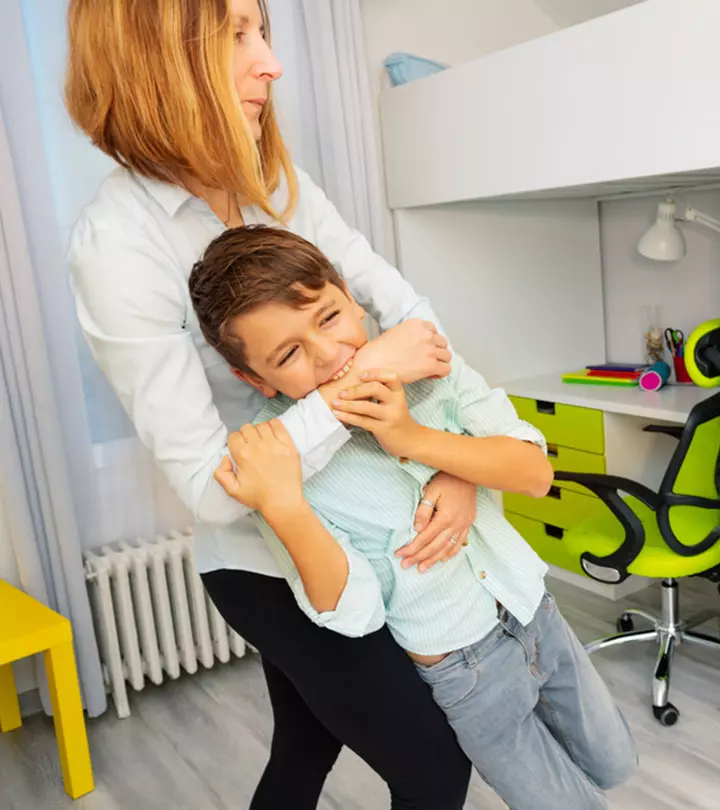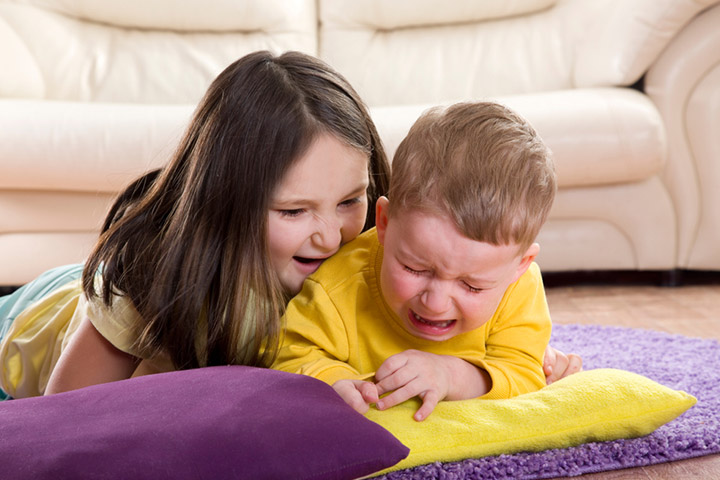
Image: Shutterstock
This may seem all kinds of bizarre to you, but anyone with a toddler knows that at some point or another, kids and biting go together like bread and butter. However, this isn’t just a coincidence or a late side effect of teething. There are legitimate emotional and biological reasons as to why your child feels the need to bite. But this doesn’t mean that the behavior should be encouraged. As bad as it is to have an energetic toddler chomp down on you, it’s worse if they were to bite someone else, especially another child. You need to teach your kids that hurting and harming others is an absolutely intolerable behavior. So, if you’re wondering how to stop your kids from biting you or anyone else and why they feel the need to do it in the first place, this is the article for you. Read on to know more!
Why Do Children Bite?
Biting doesn’t necessarily mean that something is wrong with your child. It’s a normal part of their development, and it isn’t your child’s inclination to be naughty or behave badly. Most of the time, kids don’t even know that it isn’t socially acceptable to bite someone. Many young children usually bite just in order to explore their surroundings. You may have observed your baby putting every toy and object they come across into their mouth in order to gauge what they are. Biting is just the next natural step to see what happens to the object or person. Your toddler may also bite you when they are teething so that their gums feel good. They may also bite you because they’ve seen another child do it and want to copy them. Children also have an inclination to bite in order to get your attention when they are feeling unwell, hungry or tired.
You need to keep in mind that kids are also impulsive and have next to no stimulation control. So, they might bite you without even thinking of the consequences. Most of the time, kids don’t mean to hurt or harm you, they just want to get a reaction out of you. Kids also bite when they are bored or over-excited and can’t contain themselves. They can bite when they are overstimulated as a way to calm themselves down. Toddlers tend to bite when they are throwing a tantrum and are frustrated that they are not getting their way. Feeling powerless, stressed and anxious are all reasons for your little one to turn into Dracula.
How Should I Respond When My Child Bites?
1. Stay Calm
Modeling self control for your child is a great way to encourage them towards learning to control their own impulses. Besides, once they realize that biting you isn’t really getting the reaction they want and expected, they’ll stop and change tactics. Staying calm will also help you work out the best way to deal with the situation in a composed manner. Simply tell your child to stop biting you in an even voice and spell out the consequences that they will face if they don’t. Make sure to plan out a couple of appropriate punishments for this behavior and let them know what they will be beforehand.
2. Remove Your Child From The Situation
Sometimes, it really isn’t your kid who starts the fights and the biting. Whenever you see kids starting to get aggressive, the best thing to do is separate them so that no one gets hurt. Once you have your child alone and they have calmed down a bit, ask them what happened and why they felt the need to bite another person. Listen to what they have to say and let them vent out their frustration. Once you validate their emotions, you can suggest a couple of healthier ways that they could have resolved the conflict. Let them know that biting is not acceptable and that harming people is not a good way to get what they want.
3. Tell Them That Biting Hurts
Let your toddler know in clear simple terms that biting hurts. Say something like “Biting hurts, stop biting.’ whenever they start to slowly sink their teeth into you.
4. Help Them Learn Words To Express Their Feelings
The best way to ensure that your child doesn’t bite you is to give them different tools to express their feelings. One such tool is language. Teach them how to recognise and name their emotions. This way no matter how frustrated and angry they get, they will not resort to biting you for attention and understanding.
It’s crucial to teach your kids that biting is wrong and that the behavior must be stopped. However, keep in mind that simply yelling at your child won’t do the trick. Be patient with them and help them understand why biting is unacceptable. This way, they won’t repeat the action with you or anyone else.














